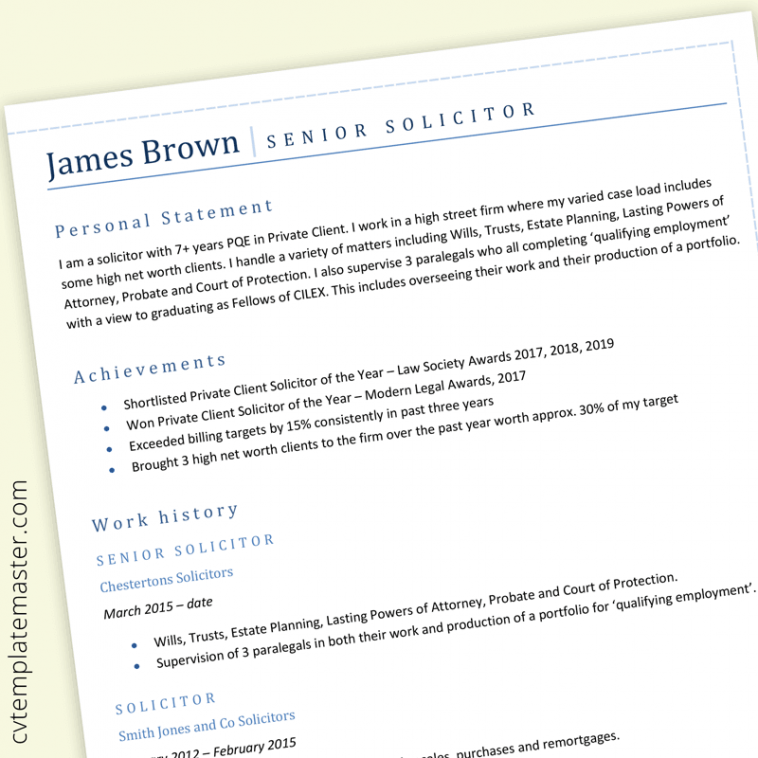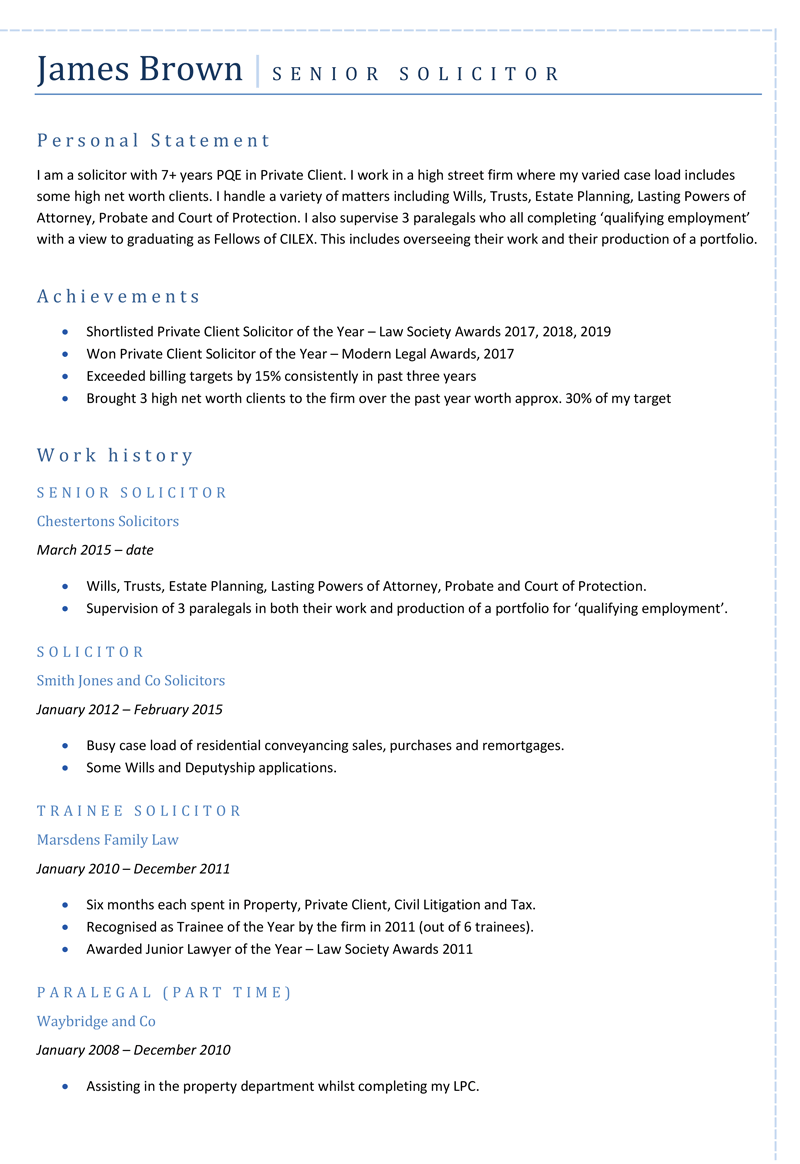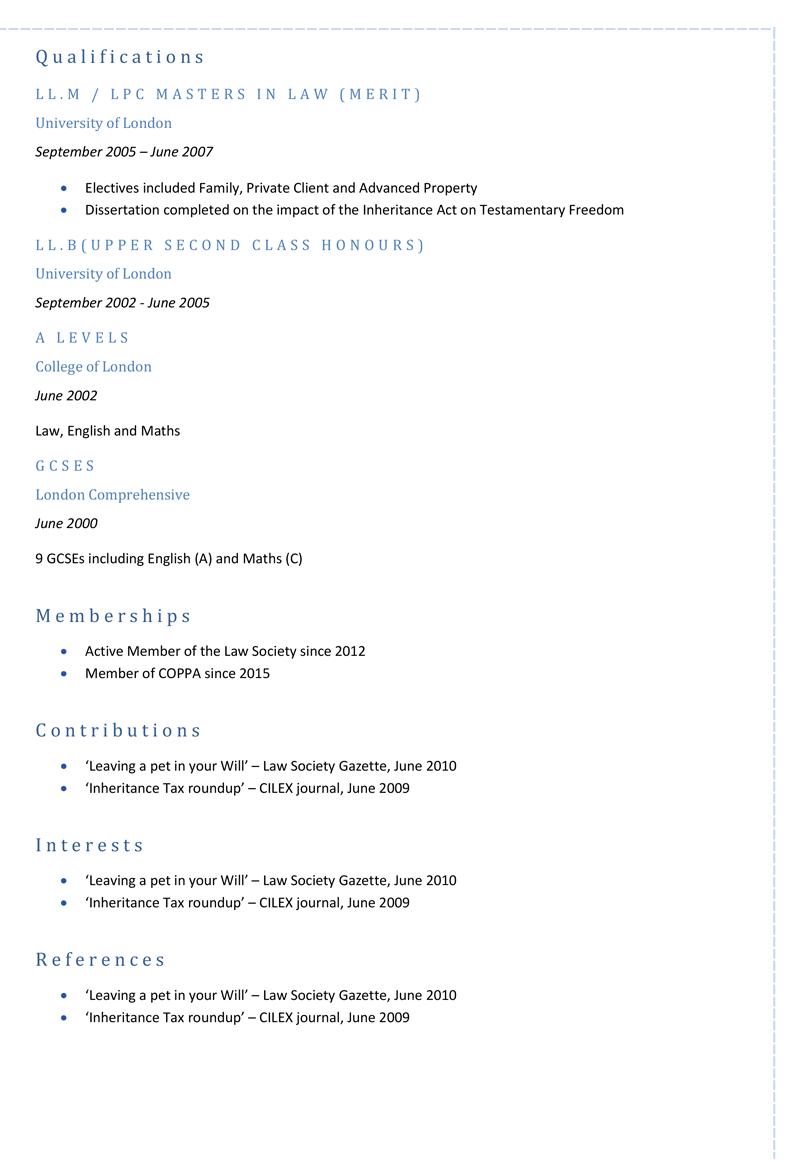Text preview of this CV template:
This is a text-only preview - download the formatted Word file using the link above.
James Brown | SENIOR SOLICITOR
Personal Statement
I am a solicitor with 7+ years PQE in Private Client. I work in a high street firm where my varied case load includes some high net worth clients. I handle a variety of matters including Wills, Trusts, Estate Planning, Lasting Powers of Attorney, Probate and Court of Protection. I also supervise 3 paralegals who all completing ‘qualifying employment’ with a view to graduating as Fellows of CILEX. This includes overseeing their work and their production of a portfolio.
Achievements
- Shortlisted Private Client Solicitor of the Year – Law Society Awards 2017, 2018, 2019
- Won Private Client Solicitor of the Year – Modern Legal Awards, 2017
- Exceeded billing targets by 15% consistently in past three years
- Brought 3 high net worth clients to the firm over the past year worth approx. 30% of my target
Work History
Senior Solicitor
Chestertons Solicitors
March 2015 – date
- Wills, Trusts, Estate Planning, Lasting Powers of Attorney, Probate and Court of Protection.
- Supervision of 3 paralegals in both their work and production of a portfolio for ‘qualifying employment’.
Solicitor
Smith Jones and Co Solicitors
January 2012 – February 2015
- Busy case load of residential conveyancing sales, purchases and remortgages.
- Some Wills and Deputyship applications.
Trainee Solicitor
Marsdens Family Law
January 2010 – December 2011
- Six months each spent in Property, Private Client, Civil Litigation and Tax.
- Recognised as Trainee of the Year by the firm in 2011 (out of 6 trainees).
- Awarded Junior Lawyer of the Year – Law Society Awards 2011
Paralegal (part time)
Waybridge and Co
January 2008 – December 2010
- Assisting in the property department whilst completing my LPC.
Qualifications
LL.M / LPC Masters in law (merit)
University of London
September 2005 – June 2007
- Electives included Family, Private Client and Advanced Property
- Dissertation completed on the impact of the Inheritance Act on Testamentary Freedom
LL.B (upper second class honours)
University of London
September 2002 – June 2005
A Levels
College of London
June 2002
Law, English and Maths
GCSEs
London Comprehensive
June 2000
9 GCSEs including English (A) and Maths (C)
Memberships
- Active Member of the Law Society since 2012
- Member of CoPPA Membe since 2015
Contributions
- ‘Leaving a pet in your Will’ – Law Society Gazette, June 2010
- ‘Inheritance Tax roundup’ – CILEX journal, June 2009
Interests
- Gardening and DIY
- Visiting the gym
- Spending time with family
References
- Alice Clark, HR Manager, Chestertons | alice.clark@chestertons.co.uk
- James Brown, HR Manager, Smith Jones & Co | jamesbrown@smithjonesco.co.uk
Template details:

This Law CV example is free to download and edit for your own personal use. Here’s a full preview of page one:

And here’s page two:

How to write a Law CV
This guide shows you how to write a CV for a legal position, and what sections to include.
So you’ve downloaded our free Law CV template – but how do you write the perfect CV? Here’s a step-by-step guide to producing a great law CV, written by a practising solicitor and recruiter.
Personal details
- There’s no need to give the personal details section a title – employers will expect to see these details just after your name.
- Include your first and last name at the top of the CV. There’s no need to include a salutation (Mr, Mrs, Miss etc).
- Designatory letters such as LL.B after your name are optional. If you haven’t yet qualified (e.g. as a Solicitor, Fellow of CILEX, full STEP member or Licensed Conveyancer) it can be helpful to show the employer what stage you’re at (e.g. LL.B, GCILEX).
- If you’ve qualified already, you might want to include your professional title instead (e.g. Solicitor, Chartered Legal Executive, TEP).
- DON’T include any details that could potentially lead to discrimination, such as protected characteristics (gender, religion, nationality etc) or the fact you are married / have children. The recruiter does not need this information.
Personal Statement
There are certain key bits of information that a legal recruiter is looking for in your personal statement (or ‘personal profile’). The job advert is your starting point to working out what’s important to this particular firm. Their website may also reveal a lot about their values and focuses. After that, law firms typically want to know:
- How much experience you have (particularly PQE – post qualification experience)
- What areas of law you’ve worked in (e.g. Private Client, Family, Property)
- Whether you have any niche experience or specialisms
- Whether you’ve supervised staff before
Achievements
The ‘achievements’ section is completely optional but if you have some impressive accolades, they can help grab the employer’s attention. Some people choose to include this section further down (for example, after ‘Qualifications’) but our view is that it should appear early on if you have something worth including.
You might want to mention, for example:
- Exceeding billing targets
- Bringing high value clients to your current firm
- Legal awards that you’ve won or been shortlisted for
- Any particularly impressive publications that you’ve written for (see below on publications)
Work history
Your work history section should be in reverse chronological order – i.e. most recent first. Include:
- Your position (e.g. “Solicitor”, “Lawyer”, “Chartered Legal Executive”, “Paralegal”, “Partner”, “Associate” etc)
- Dates of employment (month and year, from and to)
- The name of the firm
- Optionally the location, if necessary to distinguish the firm from other similarly named law firms
In addition, if the firm is small or lesser-known, you might want to include a line explaining what they do. For example:
“ABC Law is a small commercial law firm based in Holborn.”
“XYZ Law is a small high-street firm catering for both private and commercial clients.”
“DVL Law is a niche-Centre firm specialising in employment law.”
Aside from these all-important details, law firms want to know:
- Your field of expertise.
- The type of work covered – for example, ‘Private Client’ might include Wills, Trusts, Estate Planning, Lasting Powers of Attorney, Probate and Court of Protection. It is worth giving a breakdown of what exactly you do like this, since all firms work differently and some are more specialised than others.
- Any supervisory experience.
- Some indication of work load.
Optionally, you might want to include:
- Whether you do your own typing/administrative work.
- Any particularly significant pieces of work you’ve completed or cases you’ve worked on.
- If you’ve met or exceeded any particular targets.
- Details of any progression or additional responsibility.
For those who have completed training contracts or qualifying legal employment for a professional qualification, the recruiter will want to know what seats (or fields of law) were covered.
Remember as a legal professional that you owe your clients a duty of confidentiality. You cannot name client names here, unless the fact that you represented them in a case is a matter of public record or they’ve given you express permission to do so.
TIP: If you’re short on work experience, review our school leaver’s CV to see what type of activity you could include.
Qualifications
List your qualifications, most recent first. If the employer has asked for a particular qualification, make sure this is prominent.
Include:
- The qualification e.g. LL.B, LPC, Masters
- The grade received e.g. 1st Class Honours, Merit
- The dates you studied this qualification
- The institution that you studied with
Optionally, you might include additional details such as electives chosen or the topic of your dissertation. If you are not yet qualified, you might want to include any impressive grades for individual modules too.
There’s no need to give ‘year from’ and ‘year to’ for A levels and GCSEs – you can just put the year in which you attained the qualification. In fact, if you’re already qualified and you’re struggling for space, you can condense the information you give on lower level qualifications or remove it completely.
Skills
We haven’t included a skills section in this example CV as it has been written around a Senior Solicitor. However, for those who have not yet qualified or who have qualified but without a great deal of experience, a key skills section can be really beneficial. Take clues from the job advert, but in the absence of specifics consider that some of the legal skills employers value in junior staff are:
- Writing and drafting
- Researching
- Problem solving
- Debating (this shows your ability to find and present a legal argument convincingly)
- Interviewing and advising
- Oral communication – listening, questioning, non verbal
- Negotiating
- Advocacy skills
- Commercial awareness
- Networking
Job profile websites such as Prospects.ac.uk can be helpful in discovering which skills a legal recruiter is likely to be looking for. See, e.g. ‘Paralegal Job Profile‘.
It will add very little value to your CV if you simply list off these skills. Instead, find examples for how you have acquired and/or used them. E.g.
“At my current firm I was assigned to monitor and report on the Ilott v Mitson case which reached the Supreme Court in December 2016. I researched the background of the case including the development of the Inheritance Act in case law, and produced a series of 9 blog updates covering its progression. When the Supreme Court delivered its verdict in December, I delivered a presentation to our fee earners.”
“Whilst undertaking my law degree, I took part in the debating team for 3 years, attending the National Championships each year and representing the University on three occasions (two of which I won).”
“Whilst undertaking my training contract it was my responsibility to take all face-to-face instructions for new conveyancing clients, and provide them with regular updates on their matter.”
You can include these examples either in a dedicated skills section, or within other sections (e.g. Personal Statement, Work History, Qualifications).
It is not really necessary for experienced fee earners to include such examples to evidence their skills. A recruiter will assume that if you’ve been interviewing clients for five years as a fee earner, you’ll be reasonably good at it! However, if you have skills the recruiter has not requested which may be valuable to the firm, DO mention them. For example, you may have training or supervisory skills; or you may have previously written legal blogs for past employers.
Memberships
Memberships is another optional section and the opportunity to demonstrate any links you have with professional bodies in the legal profession. It’s worth mentioning any branches of your regulator that you’re involved with as this can help show an interest in networking and furthering the profession.
If you’re not already affiliated with a regulator, this may be an opportunity to build useful contacts, develop your career and demonstrate your professionalism. Check out CILEX’s range of membership options which are highly inclusive.
Contributions
If you’ve contributed articles to legal publications or you write for your firm’s blog, include details here. If you’ve blogged and written extensively, include a summary with a few select examples of your best work. Focus in particular on anything you’ve written that relates to the position you’re applying for.
Interests
Whilst interests are optional, they are often a missed opportunity to add a lot of value. They can demonstrate a lot of valuable soft skills such as sports (teamwork, communication, leadership). In addition they demonstrate that you take an interest in your personal health which suggests to prospective legal recruiters that you’ll take less sick days.
Finally…
Do choose one of our quality CV templates. We offer a range of formats and layouts, from highly professional to beautifully creative. A free CV template gives you a head start, ensuring you know what to include on your CV and making the CV writing process so much easier for you.
Originally published 17th March 2020

good one